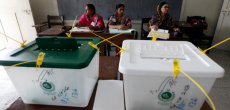[vc_row][vc_column][vc_column_text dp_text_size=”size-4″]
On Friday, the Supreme Court granted permission to PTI leaders Sanam Javed and Shaukat Basra to participate in the upcoming elections scheduled for February 8. The decision was reached following the hearing of petitions filed by the two leaders against the Election Commission of Pakistan’s (ECP) decision to reject their nomination papers. The three-member bench, composed of Justice Muneeb Akhtar, Justice Shahid Waheed, and Justice Irfan Saadat, directed the electoral watchdog to include their names on the ballot paper and instructed that elections in their constituencies proceed on February 8 without fail.
Sanam Javed, who has faced months of detention in connection with nine cases since May, is set to contest the elections against PML-N leader Maryam Nawaz in NA-119 Lahore. Additionally, she has submitted nomination papers for PP-150.
Read more: PTI Activist Sanam Javed Rearrested By Authorities
The Supreme Court’s intervention in approving the nomination papers of Sanam Javed and Shaukat Basra highlights the legal and procedural aspects involved in the electoral process. The court’s directive to the Election Commission underscores the importance of ensuring that candidates are given fair consideration and that the electoral process remains transparent and adheres to legal principles.
In the context of Sanam Javed’s candidacy against prominent political figure Maryam Nawaz, the upcoming elections in NA-119 Lahore are likely to draw significant attention. The decision to allow Sanam Javed to participate in the electoral process adds an intriguing dimension to the political landscape, given her previous detention and the legal challenges she has faced.
As the elections approach, the involvement of key political figures, legal proceedings, and decisions by electoral authorities will continue to shape the narrative of the electoral process. The Supreme Court’s role in addressing concerns raised by candidates and ensuring a fair and inclusive electoral environment is crucial for upholding the principles of democracy and the rule of law.
The directive to hold elections in the constituencies of Sanam Javed and Shaukat Basra on February 8 emphasizes the court’s commitment to the timely conduct of the electoral process. It also serves as a reminder of the broader significance of the electoral system in shaping the democratic landscape of Pakistan.
As the political dynamics evolve, the decisions and actions surrounding electoral processes will remain under scrutiny. The participation of diverse political actors, legal interventions, and adherence to due process contribute to the overall credibility and legitimacy of the electoral outcomes. The Supreme Court’s involvement in ensuring the inclusion of candidates and the conduct of elections in a timely manner reinforces the importance of upholding democratic values and principles in the electoral framework.
[/vc_column_text][/vc_column][/vc_row]











